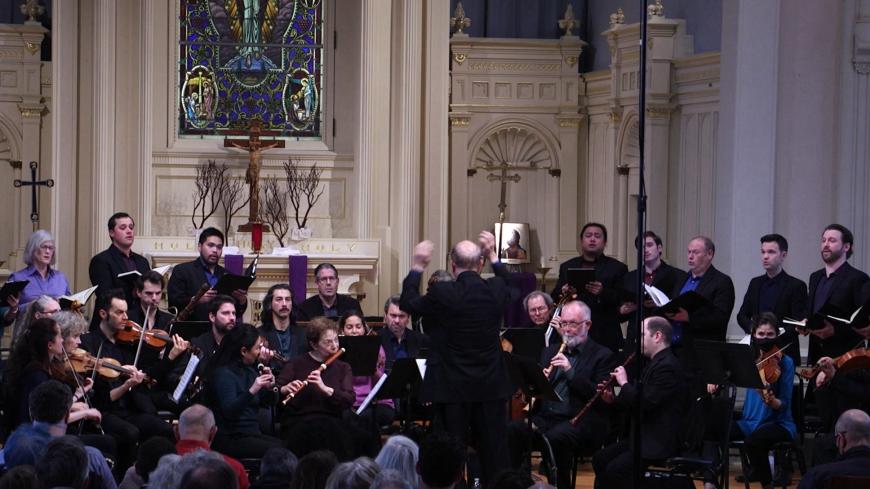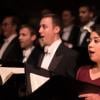
For all the discrete wonders of J.S. Bach’s St. John Passion — the transporting solos, harmonically layered choruses, sublime chorales, and percolating orchestral accompaniment — the Sunday, March 10 performance by American Bach reminded rapt listeners at San Francisco’s St. Mark’s Lutheran Church what a gripping feat of musical storytelling this great work is. Now exactly 300 years old, the composer’s depiction of Christ’s torment and crucifixion felt vividly, eternally new.
While credit for the afternoon belonged to many, Gregório Taniguchi’s textually keen and emotionally piercing account of the narrating Evangelist was its defining center and propelling through line. It’s not often that recitative can accomplish so much, but this wonderfully expressive tenor used his crystalline German diction, modulating timbres, and penetrating line readings to animate the granular details of Christ’s suffering, death, and glimmers of salvation. Rarely consulting his score, his long black hair framing a striking, lean face, Taniguchi riveted attention.

Just as compelling, on different terms, was baritone Jesse Blumberg, who sang two dynamic and engrossing arias and brought a deep, conflicted dimension to the role of Pontius Pilate. When Blumberg’s Roman governor faced off with Jesus (baritone Mischa Bouvier, intense in his composure), their stark exchanges sent a palpable theatrical charge through the audience.
In a Passion performance that delivered multiple highlights, the surpassing one may have come in the aria Blumberg delivered with the American Bach Cantorei and three string players. In this mounting, somberly gorgeous litany, sung just after the Evangelist declaims Jesus’s death on the cross, the poignant majesty of Bach’s genius shone through. Over a steadily flowing ground bass and plangent string descant, the soloist and choir sought answers that are only answerable by faith. Here, in translation from the sung German, is one such exchange, with darkness, light, and mystery conjoined:
“Have I now been delivered from death?” the soloist posed, in a kind of musical transubstantiation of Christ’s suffering.
“In my final throes,” the chorus offered, “Nowhere other guide me.”
Right from the start, in the chorus “Lord, our ruler,” the Cantorei embraced the work’s musical complexity and amplitude. Imbued with a blend of technical precision, translucent part singing, and dynamic responsiveness under redoubtable conductor and Artistic Director Jeffrey Thomas, the Cantorei built this Passion’s expansive bedrock.
The choruses and chorales had a resplendent fullness of tone and feeling. As a crowd taunting Jesus in Part 2, the Cantorei sang with a harsh, sarcastic edge. In a moment that Dickens might have channeled, the singers blithely proposed casting lots for the woven coat worn at Christ’s death. More than a few times, the work’s narrative reveals the black depths of human nature.
Yet even as he captured the visceral suffering and anguish of Christ’s final hours, Bach filled his Passion with hope, belief, and transcendent visions. One shining one came early on, in soprano Julie Bosworth’s aria “I’ll follow thee likewise with eager steps.” Her bright, clear tone filled the church in a flowing line that became the vocal equivalent of a long, unbroken beam of light. Later on, in a brief but urgently devotional aria, “Dissolve now, my heart, in floods of tears,” Bosworth brought a sense of fully committed immediacy to the number.
Among the other soloists, the amber-voiced mezzo-soprano Ágnes Vojtkó made a strong impression in her stricken aria “It is fulfilled!” echoing Christ’s line when his mouth is stuffed with a vinegar-soaked sponge.
The orchestra performed with its customary grace and responsiveness but not without some uncertain patches and balance problems. The solo string players were especially fine, as was the steady supple pull of the continuo parts.
At two hours and 15 minutes, including an intermission, the St. John Passion requires and compels focused attention. The printed text in the program ran to eight pages, well worth following along to appreciate the exacting poetry of Bach’s settings. Finely wrought as it was in its many particulars, American Bach’s performance finally soared as a unified whole. Whatever a listener’s religious orientation, this was a musically spiritual occasion.




